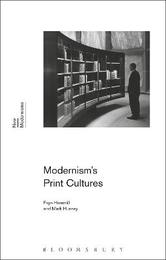
|
Modernism's Print Cultures
Paperback / softback
Main Details
| Title |
Modernism's Print Cultures
|
| Authors and Contributors |
By (author) Professor Faye Hammill
|
|
By (author) Professor Mark Hussey
|
| Series | New Modernisms |
|---|
| Physical Properties |
| Format:Paperback / softback | | Pages:232 | | Dimensions(mm): Height 216,Width 138 |
|
| Category/Genre | Literary studies - from c 1900 - |
|---|
| ISBN/Barcode |
9781472573254
|
| Classifications | Dewey:809.9112 |
|---|
| Audience | | Undergraduate | | Postgraduate, Research & Scholarly | |
|---|
|
Publishing Details |
| Publisher |
Bloomsbury Publishing PLC
|
| Imprint |
Bloomsbury Academic
|
| Publication Date |
25 August 2016 |
| Publication Country |
United Kingdom
|
Description
The print culture of the early twentieth century has become a major area of interest in contemporary Modernist Studies. Modernism's Print Cultures surveys the explosion of scholarship in this field and provides an incisive, well-informed guide for students and scholars alike. Surveying the key critical work of recent decades, the book explores such topics as: - Periodical publishing - from 'little magazines' such as Rhythm to glossy publications such as Vanity Fair - The material aspects of early twentieth-century publishing - small presses, typography, illustration and book design - The circulation of modernist print artefacts through the book trade, libraries, book clubs and cafes - Educational and political print initiatives Including accounts of archival material available online, targeted lists of key further reading and a survey of new trends in the field, this is an essential guide to an important area in the study of modernist literature.
Author Biography
Faye Hammill is Professor of English at the University of Strathclyde, UK. Her most recent books are Magazines, Travel and Middlebrow Culture (2015), with Michelle Smith, and Sophistication: A Literary and Cultural History (2010), winner of the European Society for the Study of English book award. Mark Hussey is Distinguished Professor of English at Pace University, USA. He is editor of the Cambridge edition of Virginia Woolf's Between the Acts (2011) and edits Woolf Studies Annual.
ReviewsAn exemplary book ... Modernism's Print Cultures maintains these high standards and is the best single introduction to the newish field of modernism's complex engagement with book history, periodical studies, and various other forms of printed materials: it is impressive in its coverage and authoritative in its judgments ... If you wish to learn more of how the field of print culture studies is transforming the study of modernism, this book is the place to start. * James Joyce Quarterly * Hammill (Univ. of Strathclyde, UK) and Hussey (Pace Univ.) survey the wide range of scholarly work produced during the past 25 years that has examined and analyzed literary modernism from the perspective of print culture. The focus on print culture is reflected in the subjects covered: chapter 1 looks at scholarly publications about "the physical and visual aspects of modernist printed objects," chapter 2 examines publications about "the circulation of those objects in the marketplace," and chapter 3 deals with publications about "the political and educational dimensions of print enterprises." ... [F]or those already familiar with modernist studies, this valuable, nonevaluative survey highlights certain trends in scholarship (especially the increasing interest in modernism in periodicals and in regarding all literary publications as collaboratively produced) and calls attention to the many publications, websites, and so forth that can inform future scholarly research. Summing Up: Recommended. Graduate students, researchers, faculty. * CHOICE * Hammill and Hussey move methodically through the history of book history and periodical studies since modernism's infancy, arguing that "it is possible to trace an almost continuous attention to the issues and questions addressed by the term 'print culture' from the late nineteenth century . . . to now" (24). Their task is to demonstrate how the attention paid to modernist print culture in the twenty-first century has illuminated the fact that the debates and insights of our contemporary critical practice are precisely those than animated writers, editors, publishers, and readers more than a hundred years earlier. At this they succeed with real distinction, devoting substantial chapters to the modernist book (and magazine) as a physical object, the circulation of modernist print, and the social life of politically oriented publications. Throughout, they are commanding and lucid, detailing a robust archive while at the same time attending to how critical engagements with that archive continue to rewrite the story of modernist studies. * Modernism/modernity *
|